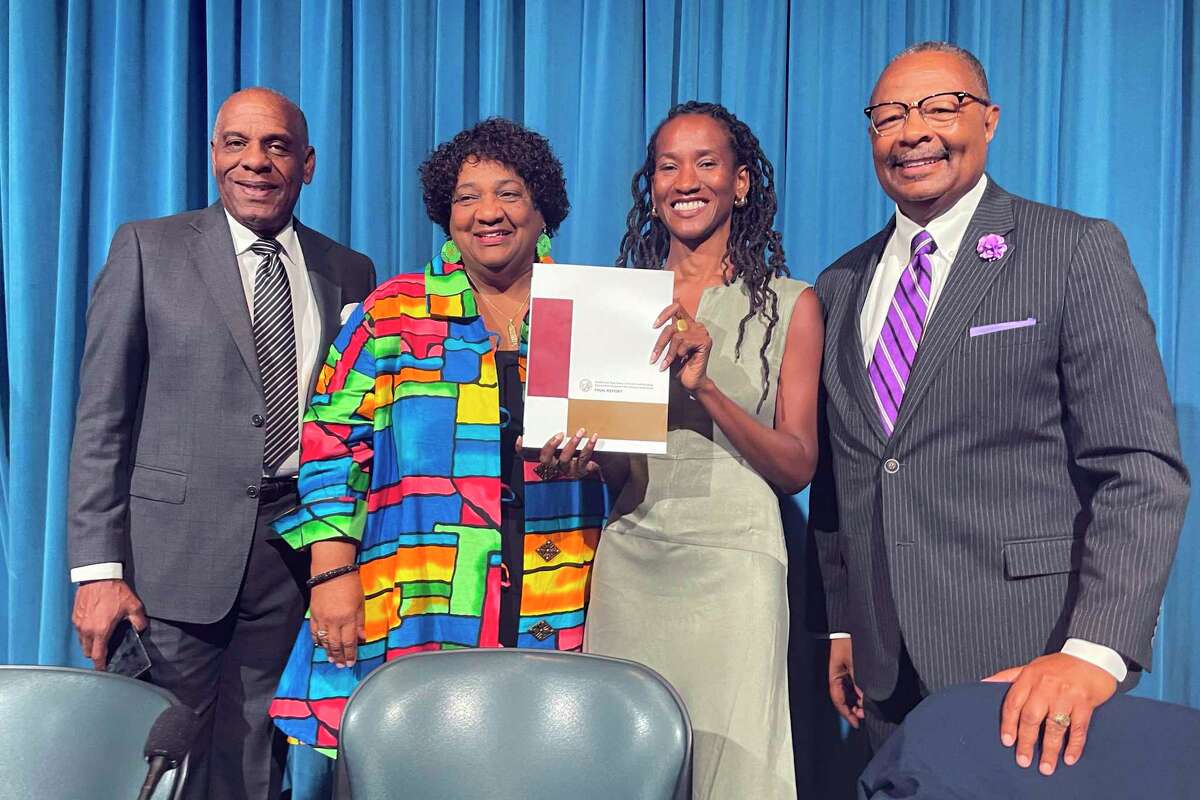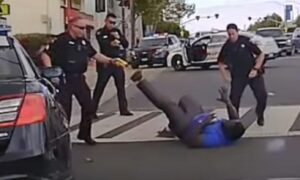One of the first audience members to speak at Thursday’s California Reparations Task Force meeting suggested Secretary of State Shirley Weber receive a Nobel Prize. A few hours later, Weber, who three years ago wrote the piece of legislation that set California on its historic reparations journey, addressed the crowd.
Weber spoke of traveling to Africa more than 30 times in search of a stolen heritage.
“I’ve been there as a scholar, I’ve been there as a visitor, I’ve been there as a friend, I’ve been there searching for myself,” she said. “And I can tell you unequivocally that I am an American. … This is my country.”
Weber’s comments and the loud affirmation they received underscored the triumphant, challenging, almost cathartic tone of the task force’s final meeting, which centered on the release of a massive report outlining the living consequences of slavery in California and how the state Legislature, all these generations later, should respond.
The 1,075-page report contains more than 115 recommendations, and is the culmination of two years of heated public hearings and fraught debates over how California should atone and which Black residents should qualify.
“We have been relegated to the bottom of the caste system in this country,” said task force chair Kamilah Moore. “Black, African American, African American freedmen, whatever you want to call us, we are resiliently surviving the afterlife of descent-based chattel slavery.”
While California was a free state, it was a free state “in name only,” noted state Sen. Steven Bradford (D-Los Angeles), a committee member who, like the Rev. Amos Brown, noted that California’s first governor, Peter Hardeman Burnett, was a segregationist slave owner.
“If you were brought here as a slave, you were treated as a slave. If you gave birth as a slave, that child was born a slave. If you were a runaway, we had a fugitive slave law that returned you back to the state and the plantation that you escaped from,” Bradford said. “People will say, ‘I didn’t own slaves, so why should I have to pay?’ And I often say, ‘If you can inherit generational wealth, you can inherit generational debt.’ And this is a debt that is owed.”
To repay that debt, the task force recommended a wide-ranging barrage of legal reforms, policy changes, new programs and, yes, financial restitution.
Among its many recommendations, the task force urges the state to: subsidize the purchase of new homes through down payment and loan assistance programs; provide free public college and university education; eliminate cash bail, three-strikes sentencing laws, and pretextual traffic stops that disproportionately target people of color; and to create a guaranteed income program for documented descendants of enslaved Black people.
It’s unclear how much all this could cost – economists advising the task force previously estimated more than $800 billion – though the task force included exhaustive financial calculations in its report to demonstrate the wealth that has been stripped from Black residents by racist policies like redlining, housing covenants and mass incarceration.
And Brown, the fiery orator, had this to say: “We’re going to make sure that our descendants will be able to consult this great document and see the evidence that this state committed the crime against Black folks. And it’s time for them to pay their crime bill.”
As the public and lawmakers digest what’s in the report, all that is at stake is this: Did California create a template or will it serve as a cautionary tale? California may have some positive headwinds in its favor.
In May, UCLA’s Center for African American Studies found majority support for reparations in the state.
The report, which comes from the center’s Black Policy Project, provided a stark contrast to national polls published in 2020, 2021 and 2022 that showed a majority of people in the U.S. were against reparations.
The UCLA report surveyed more than 2,400 adults about their views on 11 reparations measures between May 10 and June 6. The numbers showed Californians of all races are particularly supportive of reparations through investment in education, housing, healthcare and economic development.
Black and Latino residents were more likely to embrace reparations in all forms compared to white and Asian American Californians. Millennials and Generation Z adults were more supportive of reparations than Gen Xers and Baby Boomers.
The most widely supported type of reparations across all polled racial and ethnic groups was non-cash monetary measures: 97% among Black people; 93% among Latino respondents’ and 86% among both white and Asian American people.
Only 47% of white people and 46% of Asian Americans supported direct cash payments as a form of reparations. Black people were at 87% support and Latino people showed relatively strong support at 66%.
“What’s unspoken in this data is an interpretation of race and reward, and the question of who is deserving of such a reward,” said Michael A. Stoll, professor of public policy at UCLA and director of BPP. “There’s a moral judgment being made about what Blacks would do with the cash, as though they would waste it.”
When I spoke with Stoll, he said the survey results made him “cautiously optimistic” about the state task force’s recommendations being fulfilled by lawmakers.
“But the public support for reparations in this state is still fragile, and depends heavily on context and framing,” he added.
Since its first meeting in 2021, the task force has been under intense scrutiny. Its work has not only influenced local reparations efforts, but has also been fodder for the Republican outrage machine, which delights in condemning California for its, at times, notable progressivism.
Now that the recommendations are out there, the state Legislature that receives them has only two ways to go. Prove the right-wing conservatives right, or shine the path forward for a nation that has yet to address its original sin.
“America is more than a place,” said California Attorney General Rob Bonta, whose Department of Justice oversaw the task force. “And today we moved closer to being a more perfect union. … And of course I’m proud to say we’re being led by California.”
Reach Justin Phillips: jphillips@sfchronicle.com






